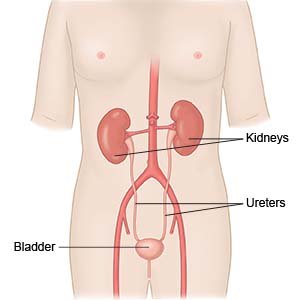Open Nephrolithotomy
Medically reviewed by Drugs.com. Last updated on Apr 6, 2025.
WHAT YOU NEED TO KNOW:
Open nephrolithotomy is surgery to remove kidney stones.
 |
HOW TO PREPARE:
The week before your surgery:
- Arrange to have someone drive you home after your surgery.
- Tell your surgeon about all medicines you currently take. He or she will tell you if you need to stop any medicine for surgery, and when to stop. He or she will tell you which medicines to take or not take on the day of surgery.
- You may be given antibiotics to help prevent an infection caused by bacteria. Tell your surgeon if you had an allergic reaction to antibiotics.
- Contrast liquid may be used during your surgery to help your surgeon see the kidney better. Tell him or her if you have ever had an allergic reaction to contrast liquid.
- You may need to have blood and urine tests. You may also need an ultrasound and x-rays of the urinary tract, or a CT scan.
The night before your surgery:
You may be told not to eat or drink anything after midnight.
The day of your surgery:
- You or a close family member will be asked to sign a legal document called a consent form. It gives healthcare providers permission to do the procedure or surgery. It also explains the problems that may happen, and your choices. Make sure all your questions are answered before you sign this form.
- Take only the medicines your surgeon told you to take.
- An IV will be placed into a vein. You may be given medicine or liquids through the IV.
- An anesthesiologist will talk to you before your surgery. Tell him or her if you or anyone in your family had a problem with anesthesia. General anesthesia will be given to keep you asleep and free from pain during surgery.
WHAT WILL HAPPEN:
What will happen:
- Your surgeon may inject contrast liquid and use an ultrasound to see parts of the kidney. He or she will make an incision in your side.
- Your surgeon will make an incision in your kidney and remove the stones. He or she may also remove a small part of the kidney to help the urine drain better. He or she may remove the whole kidney if it is badly damaged by the stones. X-rays of the kidney will be taken to check if all stones have been removed.
- Drains will be put near the kidney to remove fluid from your incisions. The incisions will be closed with stitches or surgical tape and covered with bandages.
After your surgery:
You will be taken to a room to rest until you are fully awake. Healthcare providers will monitor you closely for any problems. Do not get out of bed until your healthcare provider says it is okay. When your healthcare provider sees that you are okay, you will be taken to your hospital room. The bandages used to cover your stitches keep the area clean and dry to prevent infection. A healthcare provider may remove the bandages soon after your surgery to check the surgery area or drains.
CONTACT YOUR HEALTHCARE PROVIDER IF:
- You have a fever.
- You get a cold or the flu.
- You have a skin infection or an infected wound on or near the area where surgery will be done.
- You have questions or concerns about your surgery.
Seek Care Immediately if
- You have more pain or trouble urinating.
Risks
You may develop an infection or bleed more than expected. You may also feel pain and weakness in your abdominal muscles. Your stomach, intestines, blood vessels, or nerves may be injured during the surgery. You could have trouble breathing. Even after surgery, kidney stones may form again. You may get a life-threatening blood clot in your leg or arm.
Drugs used to treat this and similar conditions
Potassium citrate
Potassium information from Drugs.com, includes potassium side effects, interactions and indications.
Care Agreement
You have the right to help plan your care. Learn about your health condition and how it may be treated. Discuss treatment options with your healthcare providers to decide what care you want to receive. You always have the right to refuse treatment.© Copyright Merative 2025 Information is for End User's use only and may not be sold, redistributed or otherwise used for commercial purposes.
The above information is an educational aid only. It is not intended as medical advice for individual conditions or treatments. Talk to your doctor, nurse or pharmacist before following any medical regimen to see if it is safe and effective for you.
Further information
Always consult your healthcare provider to ensure the information displayed on this page applies to your personal circumstances.
